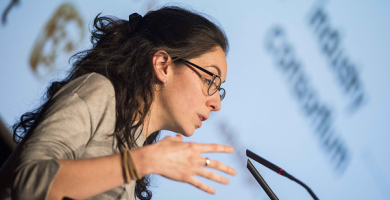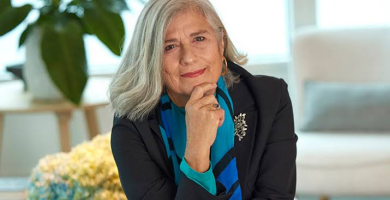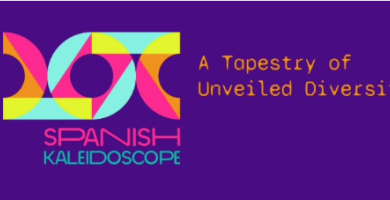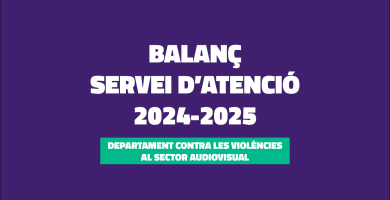
Roser Canela-Mas: “To have a greener industry, you have to believe in it personally”.
She has worked in television production and management for seven years in Barcelona on programmes such as Homo Zapping, Buenafuente and Salvados, and in the United Kingdom on Emmerdale and Coronation Street. After completing her degree in Sustainable and Environmental Management at the University of Leeds, she found this position as Sustainable Production Coordinator in albert, a project created by BAFTA and the BBC.

You work for the albert programme. What does your work consist of?
Albert is a project intended to help the audiovisual industry, both film and television, to reduce its environmental impact. This concerns production and logistics, but we are also trying - since the industry is very powerful when it comes to influencing the public - to introduce more content about sustainability into the programmes. This does not mean that the characters talk about sustainability. It may be having a Ventdelplà or any series in which the characters recycle at home, one of the characters has an electric car and you see how they plug it in. Things like that. I work for BAFTA which is the facilitator of the project, completely altruistic, which is funded by several of the country’s channels and production companies: BBC, ITV, SKY, UKTV, Channel 4, Warner Brothers, Endemol,... Big companies. BAFTA does not fund the project, but is its facilitator.
My work is basically advising and supporting the productions. I say productions because, even if the programmes are from the same producer, each programme has to obtain its own certification. I help them to calculate the environmental impact with a CO2 emissions calculator that we have and to take measures to reduce their environmental impact. With our certification, depending on the level of requirements that they fulfil, they receive one, two or three stars, and we give them a logo to put in the credits at the end of the programme. I also give free courses for professionals from the sector on climate change in general, its causes and impacts, and on the environmental impact of audiovisual production. There we give them guidelines, solutions and we carry out practical exercises.
Why was it decided to create this programme to encourage sustainable filming?
For several reasons. It began in the BBC seven years ago as a result of a survey that they carried out. There, they saw that their audiences believe that the BBC should do something to reduce its environmental impact. It was partly pressure from the television viewers, but also the industry’s reputation. Why do other industries have to do something and ours isn’t doing anything? Concern on seeing that natural resources are running out, that things are increasingly expensive. And also thinking a little about the future. We want to continue producing television and films, but will we be able to if we don’t do anything? The audiovisual industry is a huge consumer of energy; it generates great waste and requires a lot of travelling.
Is it difficult to make the productions adapt to be more environmentally sustainable? Often they do not even stop to think about the quantity of waste material that they produce just with plastic catering glasses, to give one example.
Education is therefore very important. In one year, I certified 70 productions, whereas in the two previous years only 30 were certified. People are more concerned now because they have more information. If they have this information, about what is happening and why, they do something. It is true that I also go to producers who say no. However, generally when they say no it is really because they have not looked at what type of tools we use. They are very easy if you are organized right from the beginning. Or because they are really not concerned about this issue at the moment. It is very important that you have a production manager who believes in the idea because that is when the whole team joins in with the effort.
How do you calculate whether or not the different productions are sustainable?
We basically calculate the environmental impact in CO2. We have a certification which can involve over 60 questions. There are different questions depending on the genre. A documentary will not have the same questions as a drama, for example. The answers are analyzed. There are minimums that everyone has to meet, above all in relation to communication. At the beginning of the programme, the productions have to prepare a green memo in which they have to indicate the actions that they want to take and the production department has to communicate this to everyone involved in the production: actors, teams, service companies, etc. If they do not comply with it, they do not obtain it. The same happens with paper, whether or not they use certified paper. They have to recycle the sets. These are the minimum things that they have to do in order to obtain the certificate.
How do they prove it?
It works exactly the same as any ISO certification. From among the questions that they have answered, I choose a maximum of 10 at random and they have to give me proof for these 10. I don’t see the majority of the productions in person. However, if they say that they are from London and that they went to film in Manchester and they used people from there to avoid having to travel, which is something that considerably reduces your carbon footprint, they have to send the invoices, e-mails, etc. If they say that they keep the sets or send them to a company which recycles them, they also have to send me the invoices. If the evidence is not of sufficient quality, they do not pass. All of this is then sent to a company which performs an external audit. They certify it. It is more prestigious if an external company certifies it for you. I have never sent a production which then doesn’t pass.
Can you give us examples of series or productions which have used the programme and which passed it?
Downtown Abbey, for example, changed a very high percentage of its lights to LEDs. It is also quite funny because they began without any LEDs and now they do it all with LEDs; it is a historic drama and the light and the quality are very important, and people do not notice the difference. They do not use plastic bottles any more. They give you a reusable bottle and they put drinking fountains on the set. In Emmerdale, they bought an electric van for one of the characters. You see the character plug in the car to charge it. They leased six hybrid cars, and they’re not filming in the city (in London it is easier to plug in a car). They bought them for the locations and props departments which are those which have to travel the most. Compared with non-hybrid cars, they calculated that in four years they have saved some £60,000 in petrol. They also place these cars in the background when filming and they can be seen in the series. They also built a new set all with LEDs. That is the biggest thing that they have done. It reduced their energy bill by between 80% and 90%.
A studio programme, the competition 8 Out of 10 Cats, also introduced LEDs. I met the executive producer; she came to the course and loved the idea. They wanted to be the first 100% LED panel show in the whole of England; they asked for an estimate but it was too expensive. I recommended that they introduce it gradually. The first season that they spent with us, the 19th for them, they introduced 30% LEDs. They changed the lighting director and he was delighted; he wanted more LEDs and now they have reached 70% in two seasons.
Do you also work with other countries? How do you export this idea?
Yes, in Holland they are using our CO2 calculator. It is a more environmentally aware country. Canada has signed an agreement with us. Dubai is about to sign. We provide our tools to the countries with which we collaborate and sign an agreement, so that they do not have to create a new one.
Do you think that here they have that awareness to create sustainable productions?
I think so. In general, it can be seen in Catalonia. The parliament passed the climate change law, although it has now been overturned. You can see that Barcelona is a city that is moving toward more sustainable infrastructures. Everything is seen quite differently in the world of production, but that happened in England as well. I do, however, believe that as individuals we do have this awareness here. And I believe that it depends on each individual. There is someone in a production company who says: I want to do this and then another and another, and they come together to achieve it. I believe that Catalonia does have this awareness, but now people have other problems in their head.
Are you working with your programme here? What initiatives have you started up in Barcelona if any?
I have no idea whether this would work here. I gave a talk organized by the Institut Català de les Empreses Culturals (Catalan Institute for Cultural Companies) at the CCCB and there was a very good response. Indeed, the ICEC is eager to do things. And so is the Barcelona Film Commission. I have begun to have conversations, but I believe that it is a fairly long journey. You need to begin by educating people. Taking the main players, such as Media Pro, Lavinia, Minoría Absoluta, El Terrat, TV3, etc. You offer them a one-day training and you explain what they can do. You also need them to fund it. The small production companies do not have resources to be able to fund it.
What do you think the Barcelona Film Commission can do to help?
You can be a great inspirer. For example, you can have as a requirement for the use of locations that they do not use polystyrene or plastic. We have that as a requirement in our certification. You could do that, have a series of requirements when giving licences. In London, for example, we are holding conversations for the council to let the productions connect directly to the public lighting in the places where most films are shot so as not to use generators, which is one of the things which causes the most contamination, and not just in relation to noise. Obviously, however, you first need to educate the community. Offering courses, information, holding campaigns.
Your main objective is to have an audiovisual industry with zero CO2 emissions and zero waste. What do you think is necessary to achieve this?
To have a greener industry, you have to believe in it personally. In the courses we talk about three things that you can do to reduce your ecological footprint. Look at the electricity that you consume and from where it comes. In England, for example, it costs almost the same to consume electricity from a company which uses 100% renewable energies as one which does not. This is the main thing that you can do as a company and as a person. We have an agreement with Good Energy, a company which only uses renewable energies. We create an exchange with the production companies which want to have only renewable energies and we all take the energy from the same offer, which greatly reduces the price. Second, the transport that you use. We educate a lot about asking why you have to take the train or a plane for a one-hour meeting if you could do it by videoconference. This is done a great deal there. Third, the diet, cut back the consumption of meat, and more so here because we eat a lot of meat. There, there are a lot of people who eat vegetation one or two days a week. They are people who do this after coming to the course and knowing the impact that it represents. The producers also do this in their office. You have to be creative when it comes to leading people to this. It is very difficult to apply it to the catering, although there they always have a vegetation option.
Will you offer more training courses in Barcelona?
I gave a presentation only at the Conference on cultural management and environmental sustainability to raise awareness and mobilize the cultural sector. It was organized by the Business Development Service of the ICEC. We are, however, talking about it. We offer them free of charge; we just ask for the expenses to be paid. We do, however, have to see that the public which comes is interested and that it is really useful to begin a conversation. I believe that this will happen with time.









